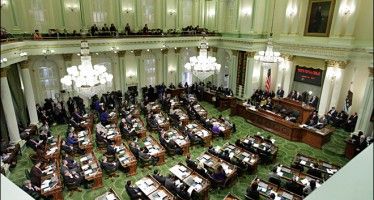Physical education settlement gives slacking CA schools a workout
 Faced with an embarrassing lawsuit over physical education requirements, California schools have opted to settle with the Golden State parent spearheading the case.
Faced with an embarrassing lawsuit over physical education requirements, California schools have opted to settle with the Golden State parent spearheading the case.
Marc Babin, who created an organization called Cal200 to further his aims, sued California in 2013 to enforce the state law governing time spent in public school on physical education. According to EdSource, Babin alleged that “37 school districts, including Los Angeles Unified, the largest district in the state, are out of compliance with state physical education law.”
Current requirements hold schools to a standard of 200 minutes of P.E. every 10 days in the first six grades of schooling. Rather than litigate the issue, the state agreed to compel elementary schools throughout the state to document their compliance with the law.
Sweeping effect
Schools from the Bay Area and Central Coast to the Central Valley and Southern California are impacted by the settlement. It will will begin to take effect after Judge Mary Wiss of the San Francisco Superior Court gives her official approval in March. By far the heaviest burden has fallen on Southland schools, especially the LAUSD.
Seeking to head the lawsuit off at the pass, LAUSD worked last year to demonstrate it was complying with the minimums imposed by state law. As the Los Angeles Times reported, LAUSD, Palm Springs Unified and other districts “asked teachers to show that they are meeting state requirements for physical education,” with lesson plans that “outline schedules for instruction, activities and classes.” As the suit proceeded through court, noted the Times, LAUSD claimed Babin’s allegations were not frivolous, but that they “had already been rectified.”
Donald Driscoll, Babin’s attorney and a fellow parent who began pushing for P.E. compliance in 2009, begged to differ. LAUSD, he said last year, “has been a particular offender. They give lip service to the idea that P.E. is important. That just plain doesn’t work. What that produces is kids who don’t get enough exercise.”
Now, Driscoll and Babin will get to see what kind of results state law can actually attain.
Tracing the problem
The terms of the settlement impose rigorous new administrative requirements that are all but certain to further strain many schools struggling to keep up with California’s transition to Common Core standards. As Jane Meredith Adams writes:
“Under the settlement agreement, elementary school teachers in the districts must report the minutes they spend teaching physical education, publish the schedule to parents and be subject to spot checks from principals. If teachers skip scheduled physical education instruction, they will note the reason why and report when those minutes were made up. The schedules will be submitted to local school boards for review.”
Adams pins the blame for the strain on cuts to the state’s education budget, noting that many elementary schools have given dedicated P.E. teachers the axe. As a result, “classroom teachers are asked to squeeze in physical education while simultaneously improving academic test scores.”
But the impact of Common Core training and expectations is severe. Last month, the Sacramento Bee editorial board was flatly warned by Michael Kirst, president of the state Board of Education, that this year’s first-time results of the statewide “Smarter Balanced” test will be “shocking.”
As the editorial board underscored:
“6.2 million children are being taught here by some 280,000 teachers in about 1,000 school districts. Two-thirds of those kids are poor, in the foster-care system or unable to speak English fluently.
“So far, only about a third of our teachers have been trained in the new standards, with Common Core math teachers particularly hard to come by. Despite floods of state money – K-12 education soaks up about 40 percent of the state budget – California’s education spending per pupil ranks near the bottom.”
Those structural problems are not about to change. Add the rigors of state-mandated P.E. to the mix, and California’s public elementary schools are in for a punishing regimen.
Related Articles
Covered CA caught in Prop. 45 crossfire
On Proposition 45, some Democrats are feeling as if they got a transfusion of the wrong blood type. The initiative would give
Fiasco at all-minority L.A. high school validates Vergara argument
The immense fiasco at 100 percent minority Jefferson High School in Los Angeles underscores the findings of Judge Rolf Treu
CA Senate panel kills whistleblower protection bill for the third time
For the third straight year, the Senate Appropriations Committee killed a bill on Thursday that would have extended whistleblower protections




